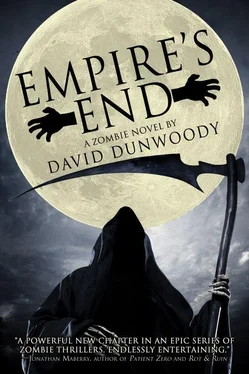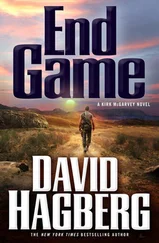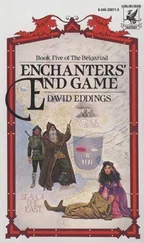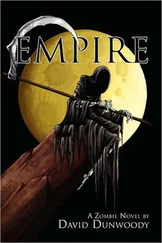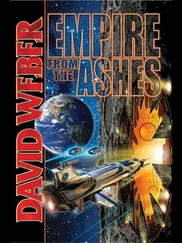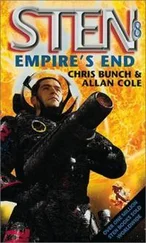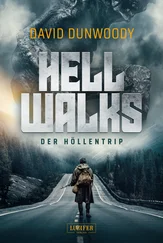“Are you?” Seated on the front bumper of a slop truck, Ryland shrugged. “I lost my watch. How’re you holding up? You look exhausted.” It was a funny remark coming from him. Bradshaw sometimes thought that maybe, when God was putting Adam together, He wasn’t happy with some of the bones He’d rendered from the earth. Some were too angular, too odd, too cruel in appearance alone. So He threw them out, and someone else double-bagged ‘em in flesh and here you had Nathan Ryland. Cancerous jowls hung from sharply jutting cheekbones, above which sunken eyes were pitted into an oblong skull. And his face bore a greenish pallor, maybe that was just the lighting. Fish, the guys called him, though not to his face because he was frequently off-base as government liaison, and also because he’d have them castrated. Kneading his gloved hands, Ryland shivered. “So? How are you?” Bradshaw said he was fine and gave his report. The debriefing upon returning from Congo had been short and sweet; he’d been taken off field duty for a month; then ordered into counseling. “Hugs and hand puppets,” cracked Ryland with a lipless smile. “I’ve already spoken with Whittaker. So it was you who shot Clarke?”
Bradshaw raised an eyebrow, but nodded. “I’m sure you had no choice,” Ryland told the eyebrow. “Collateral damage. It’s a popular phrase with my friends in Washington. It means no more questions. You’ve got nothing to worry about, Ken.”
Bradshaw grimaced in the shadows. “I know that. Doesn’t mean I have to be happy about Clarke.”
“No one said you had to be happy.” Ryland replied. “I’m sorry it took so long for me to get together with you. It’s a bad month. I’m flying to D.C. every other day and St. John’s on my ass to put in for a budget increase. He thinks I’m a lobbyist just because I don’t wear the uniform. But enough about my problems.” Standing up, he patted Bradshaw’s shoulder. “We’re good, okay?”
Bradshaw knew asking would be fruitless, but he did it anyway. “Clarke was a good… a good leader… why him? He didn’t need to be out there.”
“There’s always collateral damage. Remember that.” Ryland answered. His presence left the yard, and Bradshaw stood silent in his wake, a puppet without his puppeteer. After a few moments, he gathered up his strings and trudged toward the bunkers. On the other side of the electric fence, a silhouette peeled away from the night: a female, with papery gray flesh and hollowed-out knees giving her a strange falling-forward gait. She stopped a few feet from the fence, the muscles in her face working at something resembling a frown. Bradshaw ignored the thing and kept walking.
* * *
7,270 miles away, the relief organization Our World, based out of Brisbane, had set up a triage in Congo. They were dangerously close to the most recent clashes in the republic’s civil war, but Matt Hinzman knew that the needy tribal peoples would stay in their rainforest home — even if it meant running afoul of guerillas. As chief supervisor of the Congo effort, his decision went unchallenged, and even now, lying under a crumpled tent with his right arm gone, he didn’t regret making the call.
Sara Lister, a colleague of fourteen years, lay a few yards off. Her eye was pulled from its socket and rested in the hollow of a flayed cheek. Matthew heard feet shuffling at his back, but couldn’t turn over. He stayed motionless and hoped they couldn’t sniff him out.
The canvas tent pulled away from his body. He was turned to face a man wearing some sort of paramilitary uniform. Thank God! “The tribesmen,” Matt gasped hoarsely. “They tore us apart.”
The soldier traced Matthew’s jaw line with his fingertips. There was a nasty gash just below his chin. The soldier dug his fingernails in and pulled, paying no mind to the terrible screaming, which eventually stopped.
Sitting cross-legged in the middle of the camp, Clarke ate quietly. He eyed his surroundings in search of more meat. There was a half-devoured woman nearby clutching something in her hand. He recognized it: a pistol. He had one too, he thought, and fumbled around his waistline until he found it. The familiarity of it in his hand released a flood of memories, all clouded fragments. But recalling that he himself had been shot made him aware of the dull pain in his chest. Looking down, Clarke prodded the bullet hole. It hurt but wouldn’t keep him from moving. The hole between his legs was another story. He picked idly at the gashed tissue hanging out of his pants; more fragments came to him, the lingering memories of sensations for which he no longer had any use. Clarke tugged Hinzman’s upper lip off and chewed it for a while.
His brain shuffled his memories into some sort of order. Someone he trusted had shot him. Rules had been broken. He couldn’t recall every point of protocol, but he knew it was a mistake to leave him for dead instead of finishing the job. He never would have done that himself. Bradshaw — that was his name, Bradshaw — wouldn’t normally have done that, either. Confusing. His mind kept working while he ate. Good soldiers wouldn’t leave something like this to chance. They’d come back for him. Staying here to feed would be a risk, but then feeding anywhere would soon become a risk. He’d have to kill them all.
It was a simple decision made in the basest region of his mind. Self-preservation was his sole purpose. Clarke pulled Hinzman’s esophagus out with slick fingers. He knew he had to keep feeding in order to stay alert and heal these wounds. He knew a lot of things other afterdead didn’t.
“I never win,” Whittaker grumbled into his Captain & Coke. The Captain was being an unsympathetic prick this fine evening; Whittaker could barely feel the warmth of the liquor in his belly, not with the knot of anxiety that grew tighter with every spin of the roulette wheel.
Spending a furlough in Vegas was always an exercise in pain. Every dollar that came out of his pocket went straight into the casino’s, or into his liver — he knew it and everyone around him knew it. They encouraged it. Whittaker was used to rolling with the punches, though. He’d return to the base next week with a few bruises, take some ribbing from his comrades, then it was back to work. In the end, he figured, this yearly gouging in Vegas was better than sitting at home alone getting wasted (although the booze there was a hell of a lot cheaper).
Whittaker watched the last of his chips jump from his hands like he was a leper, then he left the casino-hotel, crossing the street to a strip joint. Ah, warm ten-dollar beer and the plastic smiles of girls whose age was anyone’s best guess in the garish crimson lighting. He took a table near the back of the room. Immediately there was a girl striding toward him. “Hi,” she said in a half-pert tone. It was early evening; Whittaker wasn’t big money. She hadn’t even brought along a bottle of champagne to hock. “What’re you in the mood for?”
“I…” He scratched his beard, leaned back, looked at the shadowy girl in the red lights. “I don’t know. I’m all right. Thanks.” She was gone before he knew it. He wiped a layer of sweat from his brow, opened his jacket, and wondered what the fuck was keeping him from putting a gun in his mouth. Christ, his sidearm was in the rental. Right across the street. He could do himself there in the car, no point in going up to his room. There’s a story for the fellas back at work. Whittaker finally cashed out. What took him so long? He winced at imagined eulogies punctuated by hollow laughter. Fuck that. He knew why he always came out here.
Leaving the bar without a drink or a dance, Whittaker got into the rental car. Like the casino and the strip joint, it smelled of stale cigarettes, and the A/C blew a hot wind across his eyes. He pulled out of the lot and headed north. A/C never got any better; he shut it off and rolled down the windows, cradling his pistol in his lap.
Читать дальше
